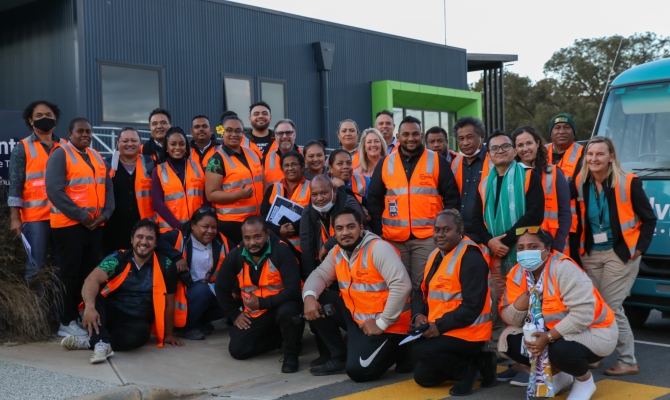
2 September 2022, Albury, Australia: After an early working breakfast with representatives from the Australian Department of Climate Change, Energy, the Environment and Water, the Sustainable Financing for Waste Management Study Tour participants bid farewell to Canberra. It was a spectacular drive through the rolling plains of New South Wales, the bright yellow camphor fields bursting in the morning light, and the team eventually arrived at the Albury Waste Management Centre, one of Australia’s most advanced waste disposal facilities.
The site is undoubtedly impressive. As a drive-through facility that enables residents to deliver all kinds of recyclable products and general waste, the site is impeccably organised and facilitates a tip shop, polystyrene recovery, mattress shredding, metal and paint recovery, furniture recovery, a construction and demolition sorting platform, a food and garden organics transfer station, and even an innovative project using black soldier fly larvae to address food waste.
‘As a regional facility, we process 200,000 tons of waste per year,’ explained Andrea Baldwin, Team Leader for Resource Recovery at Albury. ‘All of this waste used to go straight to the landfill, and we have the fourth largest landfill in New South Wales. For more than a decade we’ve focused on recycling and because we've been able to divert so much waste through this process, we’ve actually managed to extend the life of the landfill for an addition 20 years. It’s been a long and hard journey, but we are extremely proud of what we’ve been able to achieve.’
The study tour participants were given an expertly guided site tour to understand how the different facilities work, followed by a Talanoa with the site operators. A range of topics were discussed from technology, to legislative arrangements, financial considerations, energy production, and engaging with the local community, and the afternoon was alive with conversation and questions.
‘Today was enlightening,’ commented one participant. ‘There was just so much to take in. Maintaining a site like this requires both infrastructure and community education, and I was particularly interested to learn how they built the community outreach reach costs into their operations. At the end of the day, waste management requires a change of behaviour, and it was impressive to see how they have built up a relationship with their local community to help achieve this.’
‘This week we’ve spoken a lot about the circular economy,’ commented another participant. ‘But here we’ve actually seen what that looks like in operation, how different closed-loop systems can really feed into each other. Even though this site is different from the Container Deposit Schemes that we’ve seen, in reality, the financial model is quite similar, and it’s been incredibly useful to see how we can apply the principles of sustainable financing in different ways. There is a lot we can take back to the islands, and I’m inspired to see what we can do.’
Article and Photos by GEF ISLANDS/PacWastePlus – Dr Kiara Worth
The Pacific – European Union (EU) Waste Management Programme, PacWastePlus, is a 72-month programme funded by the EU and implemented by the Secretariat of the Pacific Regional Environment Programme (SPREP) to improve regional management of waste and pollution sustainably and cost-effectively. Priority waste streams include hazardous wastes (specifically asbestos, E-waste and healthcare waste), solid wastes (specifically recyclables, organic waste, disaster waste and bulky waste) and related aspects of wastewater. Countries participating in the PacWastePlus programme are: the Cook Islands, Democratic Republic of Timor-Leste, Federated States of Micronesia, Fiji, Kiribati, Nauru, Niue, Palau, Papua New Guinea, Republic of Marshall Islands, Samoa, Solomon Islands, Tonga, Tuvalu, Vanuatu
The Global Environment Facility Implementing Sustainable Low and Non-Chemical Development in Small Island Developing States (ISLANDS) Programme supports 33 Small Islands Developing States (SIDS) across the Caribbean, Indian and Pacific Oceans to safely and sustainably manage chemical and hazardous waste. A global project connects and facilitates SIDS-SIDS learning across and between project regions including through dedicated communities of practice on the Green Forum.
ISLANDS, SPREP, and PacWastePlus are using a new interactive platform for online community engagement, the Green Forum. This is a place for professionals and enthusiasts to discuss and share insights and best practices on the green transition. The Green Forum hosts Communities of Practice – including The Sustainable Financing for Waste Management in the Pacific. The objective of this Communities of Practice is to provide a space for decision makers and practitioners to share resources, common challenges and lessons learned on the design, implementation, and operation of their sustainable financing scheme. This group will also serve as the digital space for the Sustainable Financing Study Tour in Australia – co-organised by PacWastePlus and ISLANDS.
For more information:
PacWastePlus Programme
Please contact the Communications Officer, Mr Nitish Narayan at [email protected] or the Programme Manager, Mr Bradley Nolan at [email protected]
GEF ISLANDS
Please contact the Communications Coordinator, Mr John Brittain at [email protected] or the ISLANDS Pacific Child Project Manager, Mr Edward Nicholas at [email protected]
Green Forum
Please contact the Green Growth Knowledge Partnership Community Engagement Officer, Ms Clara Mottura at [email protected] or Ms Melanie Ashton, Project Coordinator and Private Sector Engagement Specialist, Coordination, Communication and Knowledge Management Project (CCKM) at [email protected]